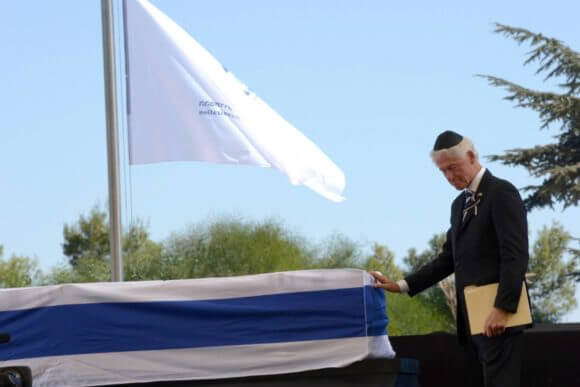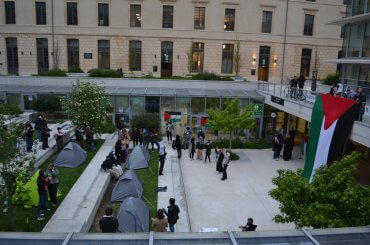More than 80 world leaders attended Shimon Peres’ funeral yesterday in Jerusalem, hearing addresses from President Barack Obama and former president Bill Clinton on Peres’s efforts to achieve a lasting agreement with the Palestinians. But though he was praised as Israel’s ambassador of peace, absent were Palestinian leaders in Israel’s government. They remembered the statesman as the statesman who “masterminded the occupation and settlement-building,” in the West Bank and Gaza.
Ayman Odeh, head of the Joint List in Israel, explained why the third largest political party in Israel would not attend over a series of tweets Thursday.
“The memory of Peres in the Arab public is different from the narrative discussed in recent days and I realize complex messages such as this are difficult to hear the moment after someone’s death,” Odeh began.
He then injected a note of praise.
“Thanks to Peres, in the 90s there were two positive and important points in the peace process, building a partnership with representatives of the Arab public, after which 90% of the Arab population voted for him [Peres],” Odeh said, referencing the period where Peres was minister of foreign affairs and oversaw secret talks that led to the signing of the Oslo Peace Accords.
Peres would go on to win the Nobel Peace Prize in 1994, shared with Israeli Prime Minister Yitzhak Rabin and Palestinian President Yasser Arafat. Together they iconized the moment with a handshake on the White House lawn. That moment was replayed throughout eulogies at the funeral, and Peres was characterized as a champion in contrast to hawkish rivals in the Israeli government.
President Obama said, “he believed that the Zionist idea would be best protected when Palestinians, too, had a state of their own. Of course, we gather here in the knowledge that Shimon never saw his dream of peace fulfilled.”
“Critics would often claim,” President Clinton said at the burial of Peres, “he was a naive overly optimistic dreamer. They were only wrong about the naive part, he knew exactly what he was doing in being overly optimistic.”
Meantime, the decision by the Joint List not to attend the funeral was attacked by the American Jewish Committee:
Sadly, the Joint Arab Party in the Knesset, the third in its size, announced it’ll not participate in the funeral. #disgrace
— Avital Leibovich (@AvitalLeibovich) September 29, 2016
Jordanian PM, Egypt FM and Head of Palestinian Authority- Abu Mazen, will attend Peres funeral tomorrow.
— Avital Leibovich (@AvitalLeibovich) September 29, 2016
But Palestinians view Peres as a man of broken promises. Oslo was supposed to produce a permanent settlement by 1999, but it failed to do so, and in 2000, the second Intifada erupted, and Peres was a minister in the Ariel Sharon government when it invaded the West Bank in 2002. Even the committee that awarded Peres’s Nobel Prize spoke openly about wanting to—but being unable to—revoke his award due to his support of military operations in the West Bank.
“[H]e masterminded the occupation and settlement-building, brought nuclear weapons to the Middle East, and unfortunately also as a president, he chose to support Netanyahu and his policies,” Odeh said.
“He was the nice face of the occupation,” one official told Mondoweiss, asking not to be named.
However, as in other issues facing Palestinians, there was no unity among leaders over the Peres funeral.
Palestinian President Mahmoud Abbas did not boycott of the funeral. He asked to come and was granted special permission to enter Jerusalem for the day. Upon arrival, Abbas and Israel’s Netanyahu shared a handshake that was recorded and televised. And so, in his passing, Peres was once again responsible for an infamous gesture between Israeli and Palestinian leaders.
The Palestinian public was not keen on Abbas’s handshake. Palestinians used the hashtag “Condolences to Peres is a betrayal” to sear the president. That hashtag trended. In 1993, the handshake on the White House lawn signalled an independent Palestinian state. Today, those hopes are dashed after more than 20 years of gridlock on the sovereignty promise.
None of this tone was reflected in speeches yesterday afternoon. Although many touched on Peres’s mixed legacy, coverage focused on the political battles inside Israel. Here Peres was an outlier. He was celebrated as one of those rare leaders who received approval from both camps.
“Shimon made a monumental contribution to guaranteeing our capacity to defend ourselves for generations,” Netanyahu said. “And for that he will have the gratitude of generations. At the same time, he made every effort throughout his adult life to achieve peace with our neighbors.”
“For both of us, the State of Israel could never be taken for granted,” said Israel’s President Reuven Rivlin, “However, with much thanks to you Shimon, for our sons and daughters, for our friends – and yes for our opponents – the State of Israel is an indisputable fact.”



When the world heard that Shimon Peres had died, it shouted “Peacemaker!” But when I heard that Peres was dead, I thought of blood and fire and slaughter.
http://www.counterpunch.org/2016/09/29/the-butcher-of-qana-shimon-peres-was-no-peacemaker/